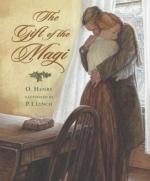|
This section contains 626 words (approx. 3 pages at 300 words per page) |

|
SOURCE: “Intercentury Humor,” in The Rise and Fall of American Humor, Holt, Rinehart, and Winston, 1968, pp. 162–284.
In the following excerpt, Bier derides O. Henry's influence on the American short story as well as early American cinema, using “The Gift of the Magi” as an example.
More and more the period became a time of accelerative mass entertainment. The serialized Sunday supplement stories of William S. Porter (“O. Henry” 1862–1910), were phenomenally successful. Kin Hubbard's popular rural comic philosopher, Abe Martin, with his whiskers and striped trousers in accompanying cartoon drawings, appeared regularly in the newspapers; he was a retrenchment of the American ideal, Downingesque and Lincolnian in his countrified wit and his very appearance as Uncle Sam. And on stage and later in the movies, the man with the lasso, Will Rogers, rose the whole distance in American iconography, reaching the pinnacle of comic idolatry in the late twenties...
|
This section contains 626 words (approx. 3 pages at 300 words per page) |

|


